286 scholarly books by Haus Publishing and 17
have author last names that start with L
286 scholarly books by Haus Publishing and 17
286 scholarly books by Haus Publishing
17 have author last names that start with L have author last names that start with L
17 have author last names that start with L have author last names that start with L
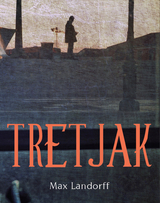
Tretjak
Max Landorff
Haus Publishing, 2014
A bestselling European psychological thriller set around the Italian lakes Gabriel Tretjak is a fixer, hired by rich clients to fix their lives, to change fate on their behalf. He does so without moral limitations or scruples. His methods draw on experimental psychology and the latest research into the human brain. His fees are high, but his clients are always willing to pay. No matter how desperate their situation, they want a happy ending. But happy for whom? Soon the body of a famous brain surgeon is discovered in a horsebox: a murder made all the more gruesome by the fact that the victim's eyes have been removed by something resembling an ice-cream scoop. The surgeon is the first victim of a murderer who leaves tantalising clues behind, all pointing to Tretjak. While Tretjak tries to stay in control, a feeling begins to take hold, a feeling that he normally uses to his advantage when working on behalf of a client. That feeling is fear. It slowly dawns on him - and soon the police - that these murders are all linked to his past. The one thing he cannot fix.
[more]

Shakespeare in Kabul
Stephen Landrigan
Haus Publishing, 2012
In 2005, a group of actors in Kabul performed Shakespeare's Love’s Labour's Lost to the cheers of Afghan audiences and the raves of foreign journalists. For the first time in years, men and women had appeared onstage together. The future held no limits, the actors believed. In this fast-moving, fondly told and frequently very funny account, Qais Akbar Omar and Stephen Landrigan capture the triumphs and foibles of the actors as they extend their Afghan passion for poetry to Shakespeare's.Both authors were part of the production. Qais, a journalist, served as Assistant Director and interpreter for Paris actress, Corinne Jaber, who had come to Afghanistan on holiday and returned to direct the play. Stephen, himself a playwright, assembled a team of Afghan translators to fashion a script in Dari as poetic as Shakespeare's. This chronicle of optimism plays out against the heartbreak of knowing that things in Afghanistan have not turned out the way the actors expected.
[more]
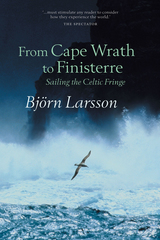
From Cape Wrath to Finisterre
Sailing the Celtic Fringe
Bjorn Larsson
Haus Publishing, 2005
From Cape Wrath to Finisterre is a travelogue and an homage to Celtic lands and waters, from their northern to their south western landfalls. Cape Wrath points towards the Arctic Circle at Scotland's furthest northerly limit. "Perhaps I was looking for a homeland, perhaps not, or at any rate a place where it would be worth trying to live for a while as well as one can for as long as it lasts." Finisterre, the furthest point in Galicia in northern Spain, was so named for being "The End of the Earth," Larsson's contemplative musings on life as seen from the cockpit and deck of his yacht enliven this journey from Denmark around Scotland, through the Irish Sea and onwards to Brittany and Spain. "Yes, I admit to rootlessness and impermanence," he admits. "But restlessness, on the other hand, is a scourge. It and its modern variant, stress, the futility of running round in circles, are to be avoided at all costs. It is far from certain, of course, that this way of life would suit everybody, but if it instils in someone the desire to experiment with alternatives. I shall be happy."
[more]
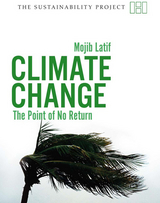
Climate Change
The Point of No Return
Mojib Latif
Haus Publishing, 2009
There is no doubt: climate change is happening, and mankind is increasingly to blame. Climate Change: The Point of No Return provides a solid basis for the current discussion about climate change, by addressing the arguments from both sides of the debate and offering an objective evaluation of the facts. Using the latest scientific information about the causes of the global climate change, Professor Latif presents the likely scenario that will face us if we don't dedicate ourselves to a course of sustainable development, and offers concrete options for action.
[more]
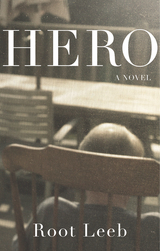
Hero
Root Leeb
Haus Publishing, 2014
A young woman who lives in Bavaria, Nele is quiet, an introvert, preferring to go unnoticed and keep to herself. That reticence carries over to her relationship with her father, Hero—until, that is, she realizes that he is seriously ill, and in fact may even be dying. That realization prompts her to work up the gumption to introduce him to her boyfriend, a Nigerian immigrant. This new-found courage impresses Hero, who comes to respect his daughter and entrusts her with a secret: a cardboard box whose contents are a mystery. Hero tells her to distribute what she finds inside to her mother and siblings, but only after his death.
Inspired in part by King Lear, this enchanting novel of families, secrets, and love is the first of Root Leeb’s works to be translated into English and is sure to win new fans for this successful German writer.
Inspired in part by King Lear, this enchanting novel of families, secrets, and love is the first of Root Leeb’s works to be translated into English and is sure to win new fans for this successful German writer.
[more]

Banker, Traitor, Scapegoat, Spy?
The Troublesome Case of Sir Edgar Speyer
Antony Lentin
Haus Publishing, 2013
Sir Edgar Speyer was a conspicuous figure in the financial, cultural, social and political life of Edwardian London. Head of the syndicate which financed the construction of the deep "tube lines" and "King of the Underground", he was also a connoisseur and active patron of the arts who rescued the "Prom" from collapse, enhanced the nation's musical and artistic life at his own expense and directed the funding of Captain Scott's Antarctic expeditions. Speyer and his wife, the concert violinist, Leonora Speyer lived in fabulously magnificent style. Early in the early summer of 1914 they stood at the peak of their success and celebrity in London society. Within weeks, on the outbreak of war, they became pariahs, objects of suspicion and aversion. Despite having been a naturalised British citizen for over 20 years and an ubiquitous public benefactor, Speyer found himself ostracised by society and mercilessly harried by the Northcliffe press. Under the Aliens Act of 1918, Speyer was summoned in 1921 before a judicial enquiry which found him guilty of disloyalty and disaffection and of communicating and trading with the enemy. He was stripped of his citizenship and membership of the Privy Council. Pilloried by The Times as a traitor, Speyer vehemently denied the charges, but he never returned to England thereafter and never forgot his ordeal.
[more]

General Smuts
South Africa
Antony Lentin
Haus Publishing, 2009
Jan Smuts was one of the key figures behind the creation of the League of Nations; Wilson was inspired by his ideas, including the mandates scheme. He pleaded for a magnanimous peace, warning that the treaty of Versailles would lead to another war.
[more]

Bealport
A Novel of a Town
Jeffrey Lewis
Haus Publishing, 2018
Bealport, Maine is one of the forgotten towns of America, a place that all too often seems to have its best days behind it. And perhaps nothing symbolizes that more than the old shoe factory—“NORUMBEGA Makers of Fine Footwear Since 1903”—that has been perpetually on the brink of failure, and is now up for sale. But maybe there’s hope? A private equity savant with a fondness for the factory’s shoes buys it—and thus sets in motion a story with profound implications for the town, and for the larger question of how we live today. The factory is a hobby for him, but it represents infinitely more for the residents of Bealport: not only their livelihoods but their self-respect, their connectedness, their sense of self-sufficiency are all bound up in it. Can this high-flying outsider understand that? How will he negotiate the complicated long-term relationships that define the town and its families?
In Bealport, Jeffrey Lewis takes us inside the town, revealing its secrets, acknowledging its problems, and honoring its ambitions. Brilliantly deploying a large cast from all walks of life, this novel reveals small town America in the early twenty-first century through the interwoven secrets and desires of its residents, and through them delivers a striking portrait of America at a moment of national uncertainty.
Bealport, called “a hugely satisfying read” by the Evening Standard and “deeply appealing” by the Times Literary Supplement, is now available in paperback.
In Bealport, Jeffrey Lewis takes us inside the town, revealing its secrets, acknowledging its problems, and honoring its ambitions. Brilliantly deploying a large cast from all walks of life, this novel reveals small town America in the early twenty-first century through the interwoven secrets and desires of its residents, and through them delivers a striking portrait of America at a moment of national uncertainty.
Bealport, called “a hugely satisfying read” by the Evening Standard and “deeply appealing” by the Times Literary Supplement, is now available in paperback.
[more]

Berlin Cantata
Jeffrey Lewis
Haus Publishing, 2013
A city that has lost one of its limbs and is receiving a miraculous gift, a little bump under the flesh, where the limb is just beginning to grow back. Thus does the American girl in Jeffrey Lewis's remarkable polyphonic novel describe Berlin and the "remnant Jews, secret GDR Jews...Soviet Jews...Jews who'd fled and come back with the victors, Jews who were lost mandarins now, Jews who'd believed in the universality of man and maybe still did" whom she finds at a Day of Atonement gathering in the eastern part of the city in a year soon after the Wall fell. Berlin Cantata deploys thirteen voices to tell a story not only of atonement, but of discovery, loss, identity, intrigue, mystery, insanity, sadomasochism and lies. At its centre is a country house owned successively by Jews, Nazis and Communists. In the country house, the American girl seeks her hidden past. In the girl, a local reporter seeks redemption. In the reporter, a false hero of the past seeks exposure. In the false hero, the American girl seeks a guide. And so it goes, a round of conspiracy and desire. Even as he describes his native city, the false hero describes the characters of Berlin Cantata: "We dined on wreckage. We were not afraid to beg. We continued our long tradition of believing either in nothing or too much."
[more]
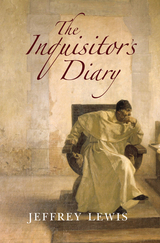
The Inquisitor's Diary
Jeffrey Lewis
Haus Publishing, 2013
Set in Mexico City in 1649, when the Spanish Inquisition holds sway, TheInquisitor’s Diary takes the form of the diary of Fray Alonso, the most zealous advocate of their mission, as he struggles to win promotion in the church. Outmaneuvered by his rivals, he is dispatched on a seemingly futile journey to the north, where he unexpectedly befriends a captured heretic—a Marrano, or crypto-Jew—and finds himself questioning all he believes in. Thought-provoking and philosophical, this novel brings the Inquisition to troubling life, with all its moral darkness and complexity.
“We follow Alonso’s journey as he is dispatched by the Inquisitor General to the country’s northern frontier to root out ‘heresy, apostasy, backsliding.’ . . . This somber work seeks to uncover those subterranean impulses that surge beneath Alonso’s fate.”—Literary Review
“We follow Alonso’s journey as he is dispatched by the Inquisitor General to the country’s northern frontier to root out ‘heresy, apostasy, backsliding.’ . . . This somber work seeks to uncover those subterranean impulses that surge beneath Alonso’s fate.”—Literary Review
[more]

Land of Cockaigne
Jeffrey Lewis
Haus Publishing, 2023
A novel written as a sharp parable of American society, addressing love, purpose, discrimination, and poverty.
In Jeffrey Lewis’s novel, the Land of Cockaigne, once an old medieval peasants’ vision of a sensual paradise on earth, is reimagined as a plot on the coast of Maine. In efforts to assuage their grief over their son’s death and to make meaning of his life, Walter Rath and Catherine Gray build what they hope will be a version of paradise for a group of young men from the Bronx. As Walter and Catherine work to reinvent this land, formerly a summer resort, the surrounding town of Sneeds Harbor proves resistant. The residents’ well-meaning doubts lead to well-hidden threats, and the Raths’ marriage unravels as Walter loses faith in democracy. Meanwhile, the Bronx boys, who have only ever known the city, try to navigate this new land that is completely alien to them. Written as a parable of contemporary American society, Land of Cockaigne is by turns furious, funny, subversive, tragic, and horrifying. Faced with the question of what to do amid disastrous times, Walter Rath offers a clue: Love is an action, not a feeling. Once you go down this path of faith, there is much to be done.
In Jeffrey Lewis’s novel, the Land of Cockaigne, once an old medieval peasants’ vision of a sensual paradise on earth, is reimagined as a plot on the coast of Maine. In efforts to assuage their grief over their son’s death and to make meaning of his life, Walter Rath and Catherine Gray build what they hope will be a version of paradise for a group of young men from the Bronx. As Walter and Catherine work to reinvent this land, formerly a summer resort, the surrounding town of Sneeds Harbor proves resistant. The residents’ well-meaning doubts lead to well-hidden threats, and the Raths’ marriage unravels as Walter loses faith in democracy. Meanwhile, the Bronx boys, who have only ever known the city, try to navigate this new land that is completely alien to them. Written as a parable of contemporary American society, Land of Cockaigne is by turns furious, funny, subversive, tragic, and horrifying. Faced with the question of what to do amid disastrous times, Walter Rath offers a clue: Love is an action, not a feeling. Once you go down this path of faith, there is much to be done.
[more]

Leonard Cohen
A Novel
Jeffrey Lewis
Haus Publishing, 2024
A man who shares his name with a famous singer must grapple with his identity, purpose, and love.
The Leonard Cohen at the center of Leonard Cohen: A Novel is an everyman, a would-be artist, a would-be lover, a would-be tragic figure, yet a man haunted by the greatness of his namesake. He struggles to compete. He struggles to be more than a punchline in his own mind. He struggles, in particular, to write one song as great as the least of the great Leonard Cohen's songs.
At the center of Leonard's life is Daphne. In their meeting on a Greek island, a contemporary fable of Daphne and Apollo plays out. But even with Daphne, Leonard is shadowed by the other Leonard Cohen, whom he fears is the real Apollo. The ancient myth haunts the fated lovers, and the nobody Leonard Cohen’s life becomes at once a mystery, a miracle, and a myth on its own terms.
Once upon a time, Apollo fell hard for Daphne, who turned herself into a laurel tree. No less a fate awaits the protagonists of this slender yet universal novel, where art, love, and fame all fatefully intertwine.
The Leonard Cohen at the center of Leonard Cohen: A Novel is an everyman, a would-be artist, a would-be lover, a would-be tragic figure, yet a man haunted by the greatness of his namesake. He struggles to compete. He struggles to be more than a punchline in his own mind. He struggles, in particular, to write one song as great as the least of the great Leonard Cohen's songs.
At the center of Leonard's life is Daphne. In their meeting on a Greek island, a contemporary fable of Daphne and Apollo plays out. But even with Daphne, Leonard is shadowed by the other Leonard Cohen, whom he fears is the real Apollo. The ancient myth haunts the fated lovers, and the nobody Leonard Cohen’s life becomes at once a mystery, a miracle, and a myth on its own terms.
Once upon a time, Apollo fell hard for Daphne, who turned herself into a laurel tree. No less a fate awaits the protagonists of this slender yet universal novel, where art, love, and fame all fatefully intertwine.
[more]
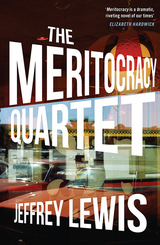
The Meritocracy Quartet
Jeffrey Lewis
Haus Publishing, 2011
Acclaimed writer Jeffrey Lewis is known for his deft portrayals of relatable figures from all walks of life. In The Meritocracy Quartet, his four interlinking novels—Meritocracy: A Love Story, The Conference of the Birds, Theme Song for an Old Show, and Adam the King—have been brought together for the first time into a single volume. Set against the backdrop of the changing American landscape over four decades, The Meritocracy Quartet is a testament to the country’s evolving personality.
The quartet follows Louie, a Yale graduate from a modest background with a gift for forging connections in high and low places. Beginning in the 1960s, as he documents a going-away party for a fellow Yalie on his way to Vietnam, and continuing through his spiritual encounters with a 1970s group of city misfits, his turn to television writing in the 1980s, and a tragic love story between two of his close friends in the 1990s, Louie chronicles not only his own personal struggles—his silent love for his best friend’s girl, his delicate relationship with an at-times absent father—but also the attitudes, events, and people that marked his generation. From the Vietnam War to George W. Bush, from television trends to the divide between the haves and have-nots, The Meritocracy Quartet is a moving witness to everything America had to offer in the latter portion of the twentieth century.
The quartet follows Louie, a Yale graduate from a modest background with a gift for forging connections in high and low places. Beginning in the 1960s, as he documents a going-away party for a fellow Yalie on his way to Vietnam, and continuing through his spiritual encounters with a 1970s group of city misfits, his turn to television writing in the 1980s, and a tragic love story between two of his close friends in the 1990s, Louie chronicles not only his own personal struggles—his silent love for his best friend’s girl, his delicate relationship with an at-times absent father—but also the attitudes, events, and people that marked his generation. From the Vietnam War to George W. Bush, from television trends to the divide between the haves and have-nots, The Meritocracy Quartet is a moving witness to everything America had to offer in the latter portion of the twentieth century.
[more]

Phantom Islands
In Search of Mythical Lands
Dirk Liesemer
Haus Publishing, 2018
From the famed Atlantis to the remote Rupes Nigra, islands have long held our fascination: they are locales isolated from ordinary life, lurking in unexplored corners of the globe and thus full of undisclosed mysteries. At times, however, our fascination with islands has bled into reality, as real maps bear the coordinates of fictional lands and travelogues tell tall tales of their inhabitants, their natural wonders, or their treasures. In Phantom Islands, Dirk Liesemer tells the stories of thirty of these fantastical islands. Beginning with their supposed discovery, he recreates their fabled landscapes, the voyages that attempted to verify their existence, and, ultimately, the moment when their existence was finally disproven. Spanning oceans and centuries, these curious tales are a chronicle of human lust for discovery and wealth.
Beautifully illustrated with colored maps and charts, Phantom Islands shows the cunning of imposters and frauds, the earnestness of explorers searching for knowledge, and the pleasure that can be found in our willingness to deceive and to be deceived.
Beautifully illustrated with colored maps and charts, Phantom Islands shows the cunning of imposters and frauds, the earnestness of explorers searching for knowledge, and the pleasure that can be found in our willingness to deceive and to be deceived.
[more]

The Dervish Bowl
The Many Lives of Arminius Vámbéry
Anabel Loyd
Haus Publishing, 2024
A narrative of the life of Arminius Vámbéry.
Who was Arminius Vámbéry? A poverty-stricken, Jewish autodidact; a linguist, traveler, and writer—or a sometime Zionist, inspiration for Dracula’s nemesis, and British secret agent? Vámbéry wrote his own story many times over, and it was these often highly embroidered accounts of journeys through Persia and Central Asia that saw him acclaimed in Victorian England as an intrepid explorer and daring adventurer. Against the backdrop of the “Great Game,” in which Russia and Britain jostled for territory, influence, and control of the borders and gateways to India and its wealth, Vámbéry played the roles of hero and double-dealer, of fascinated witness and imperialist charlatan.
The Dervish Bowl is the story of these competing narratives and a compelling investigation of both the ever-changing persona Vámbéry created for himself and the man who emerges from his private correspondence and the accounts of both his friends and his enemies, many of whom were themselves major players in the geopolitical adventures of the volatile nineteenth century—a time when Britain’s ambitions for her empire were at their height, yet nothing and no one was quite as they seemed.
Who was Arminius Vámbéry? A poverty-stricken, Jewish autodidact; a linguist, traveler, and writer—or a sometime Zionist, inspiration for Dracula’s nemesis, and British secret agent? Vámbéry wrote his own story many times over, and it was these often highly embroidered accounts of journeys through Persia and Central Asia that saw him acclaimed in Victorian England as an intrepid explorer and daring adventurer. Against the backdrop of the “Great Game,” in which Russia and Britain jostled for territory, influence, and control of the borders and gateways to India and its wealth, Vámbéry played the roles of hero and double-dealer, of fascinated witness and imperialist charlatan.
The Dervish Bowl is the story of these competing narratives and a compelling investigation of both the ever-changing persona Vámbéry created for himself and the man who emerges from his private correspondence and the accounts of both his friends and his enemies, many of whom were themselves major players in the geopolitical adventures of the volatile nineteenth century—a time when Britain’s ambitions for her empire were at their height, yet nothing and no one was quite as they seemed.
[more]

Borges in Sicily
Journey with a Blind Guide
Alejandro Luque
Haus Publishing, 2017
When Alejandro Luque receives a book of photographs taken in Sicily by the Argentinian writer, essayist, and poet Luis Borges, he decides to trace the writer’s journey, setting off with a group of friends on his own Sicilian odyssey. Meticulously identifying the location of each photograph, Luque uses Borges’s pictures to imagine the range of emotions that the renowned writer felt as he experienced the same views. As his hunt for the locations of the original photographs unfolds, Luque chronicles the ways in which he begins to fall in love with both the island itself and with his friend, Ro.
This winding journey features literati both past and present, indigenous and foreign. These characters live alongside Luque’s own comments and observations in a narrative that is rich in historical and personal detail. The writer who inspired this great journey, Borges himself, becomes a character in this narrative that is infused with extracts and reflections from his essays and poetry. Borges in Sicily acts as a travel diary, a guide to the most fascinating places in Sicily, a recounting of Borges’s journey around the island, and a deeply poetic story of Luque’s own adventures. The book also includes twenty-three photographs from the renowned Magnum photographer Ferdinando Scianna, and it won the 1st Premio International del Libros de Viajes.
This winding journey features literati both past and present, indigenous and foreign. These characters live alongside Luque’s own comments and observations in a narrative that is rich in historical and personal detail. The writer who inspired this great journey, Borges himself, becomes a character in this narrative that is infused with extracts and reflections from his essays and poetry. Borges in Sicily acts as a travel diary, a guide to the most fascinating places in Sicily, a recounting of Borges’s journey around the island, and a deeply poetic story of Luque’s own adventures. The book also includes twenty-three photographs from the renowned Magnum photographer Ferdinando Scianna, and it won the 1st Premio International del Libros de Viajes.
[more]

Barbarian Spring
Jonas Lüscher
Haus Publishing, 2014
On a business trip to Tunisia, Preising, a leading Swiss industrialist, is invited to spend the week with the daughter of a local gangster. He accompanies her to the wedding of two London city traders at a desert luxury resort that was once the site of an old Berber oasis. With the wedding party in full swing and the bride riding up the aisle on a camel, no one is aware that the global financial system stands on the brink of collapse. As the wedding guests nurse their hangovers, they learn that the British pound has depreciated tenfold, and their world begins to crumble around them.
So begins Barbarian Spring, the debut novel from Jonas Lüscher, a major emerging voice in European fiction. The timely and unusual novel centers on a culture clash between high finance and the value system of the Maghreb. Provocative and entertaining, Barbarian Spring is a refreshingly original and all-too-believable satire for our times.
So begins Barbarian Spring, the debut novel from Jonas Lüscher, a major emerging voice in European fiction. The timely and unusual novel centers on a culture clash between high finance and the value system of the Maghreb. Provocative and entertaining, Barbarian Spring is a refreshingly original and all-too-believable satire for our times.
[more]
READERS
Browse our collection.
PUBLISHERS
See BiblioVault's publisher services.
STUDENT SERVICES
Files for college accessibility offices.
UChicago Accessibility Resources
home | accessibility | search | about | contact us
BiblioVault ® 2001 - 2024
The University of Chicago Press









